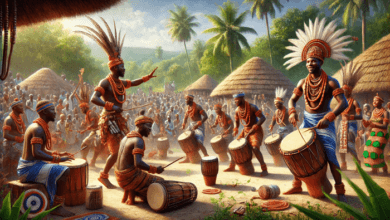Women in Igbo Society

Rich and diverse, the Igbo culture found in the southeastern region of Nigeria. Firstly, the role women play in Igbo society is diverse and interwoven into their immediate community.
These integral roles, duties, and societal postures have changed from traditional to modern times, while the necessary cultural implementation of these values helped maintain a continuity throughout societal changes. In this article, we highlight the dynamic role of women in Igbo society, particularly their influence in traditional societies, which has undergone transformation in modern times.
Roles and Responsibilities in Traditional Igbo Society
Women occupy significant roles in traditional Igbo society, families and communities. Their functions were vital in keeping social, economic and cultural balance.
1. Family and Domestic Roles
Women were on the hook for a childbearing role, a nurturing role, and a maintaining-the-household role. Motherhood embarked them in upbringing family values and traditions, with which they shared cultural practices and morals with their children. Often an extended family, the clan relied on the leadership and nurturing of its matriarch.
2. Economic Contributions
Igbo women were politically active and were economically productive farmers, traders, and craftswomen. They grew crops such as cassava, vegetables, and cocoyam, crucial for subsistence and trade. Women penetrated the local markets appearing as crucial attachments to economic species. Market associations, often led by women, oversaw trade practices, mediated disputes.
3. Political and Social Influence
Although formal political leadership in depth of Igbo was erstwhile masculine, women adopted influence done informal institutions. Umuada (daughters of the lineage) and women’s councils gave women a voice to fight family and community ills. They mediated marital disputes and enforced cultural values.
Moreover, women played ritualistic roles in religion and spirituality as priestesses, diviners, or caretakers of sacred activities. These offices bestowed upon them much respect and power in the community.
Transformation in Modern Igbo Society
Colonialism, Christianity, and globalization brought dramatic rearrangements to the structure of Igbo society while reshaping women’s functions and status. Here in modernity, Igbo women have been navigating recent changes and balancing the traditional with modern realities.
Education and Professional Advancement
Fast forward to today, education has played a significant role in empowering women in the Igbo society. Igbo women have thrived in diverse fields like academia, law, medicine, and engineering, armed with degrees facilitated through access to formal education. Igbo women have also stepped into global leadership roles with women like Professor Ngozi Okonjo-Iweala leading the charge.
Economic Empowerment
Igbo women have also since taken over the economic terrain. These are successful businessmen who apply their knowledge of old school trading to create large companies domestically and abroad. Microfinance schemes and cooperative societies have all made them economically independent.
Political Participation
Though getting political representation is still quite challenging, modern Igbo women have taken more active roles in governance and advocacy. This due in part to organizations and movements fighting for gender equity who have increased their presence in demanding a seat at the table on proposed legislation affecting their lives.
Difficulties and Adaptability
Despite these achievements, Igbo women continue to face challenges, including cultural norms, gender-based violence, and limited access to positions of leadership. Yet, they still display resilience, and fight for gender equality and the advancement of society.
Continuity and Change
They are a combination of what has been a tradition and what is new. Old practices, such as the Umuada and market associations, endure alongside contemporary innovations. Whatever the case, Igbo men will always remember their wives for all the sacrifices they made to keep the home front going.
In Igbo society, women are multifaceted beings and form an integral part of the cultural tapestry. Traditional custodians of family and community values since, and modern professionals and leaders, they have consistently contributed to and defined Igbo culture. The empowerment of Igbo women will continue to grow over time as society progresses, with the advancement of gender equality and the dismantling of systemic barriers.




